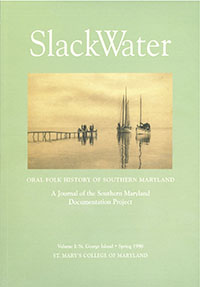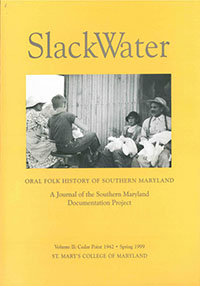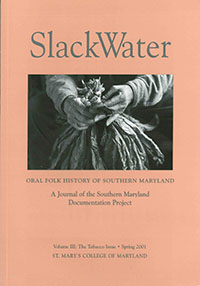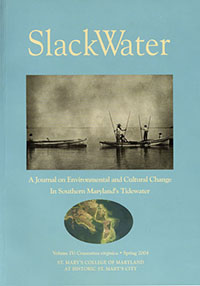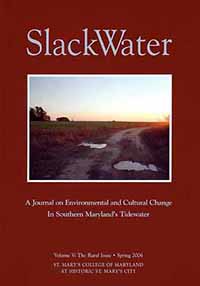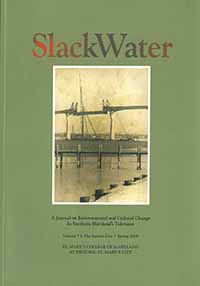It's Our River: Commonwealth of Virginia v. Maryland, Take 1
In 1946 legislative researcher Carl Everstine estimated that roughly 62%of the commercial oyster catch from the 1944-45 season had been harvested illegally, with the majority of the illegal dredging attributed to Virginia watermen. The problem stemmed from an unwieldy governance structure in place since the 18th century. In the 1940s the Potomac was still governed by the Compact of 1785, the product of laborious negotiations between Virginia and Maryland over fishing and passage rights in the river. The Compact of 1785 effectively gave Virginia free and equal rights to the Potomac fisheries while upholding Maryland's title to the river under the 1632 charter Charles I granted to Lord Baltimore. More significantly, it declared that any river-related legislation must be passed by both states.
In 1957, Maryland Delegate J. Frank Raley pushed Maryland to abrogate the Compact altogether, a move which prompted Virginia to take the matter to the U.S. Supreme Court. The result was the Potomac River Compact of 1958, which grew out of a bi-state commission to develop a new agreement between Maryland and Virginia.
Virginia had little trouble passing the new Potomac River Compact, but ratification was a much more difficult process for Marylanders, some of whom accused Raley of ''giving the river away." One of the most vocal against the new Potomac River Compact was Walter Dorsey, state's attorney for St. Mary's County from 1954 to 1958 and a state senator from 1959 to 1962. Believing that the 1958 Compact put "too much power in the hands of too few," Dorsey forced the matter to a referendum and lost. The 1958 Compact passed state-wide, with St. Mary's County voting overwhelmingly against it, 4,245 to 1,147.
- Victoria ]ones
As told by Walter Dorsey to Bo Knutson
Captain Chester Cullison was in charge of the Tidewater Fisheries Department, which is now the Department of Natural Resources, had local people working with him--a fellow named Wood from down at Ridge and the Pratt boys. But Captain Chester was pretty tough, and when I was State's attorney, the watermen used to come to me and say, “Walter, we can't make a living with Captain Chester, you gotta get rid of him, you gotta do something.” But there was nothing I could do about it. He was the captain, he's gonna do what he wants. So finally Captain Chester retired, and that's when they started bringing the Eastern Shore men in to take his place. And he hadn't been gone a month before the watermen came and said, “Walter, what can we do to get Captain Chester back? We can't live with these damn Eastern Shore men.” (Laughs)
You talk about Oyster Wars and my recollection is there weren't any Oyster Wars. They were a figment of the news media trying to justify the Potomac River Compact, trying to say, “Oh you got all these terrible Oyster Wars down in St. Mary's and Charles County.” There may have been some isolated shots fired by police officers, but whatever shooting was done was probably when the watermen were trying to elude the police. A lot of dredge boats from Virginia came out of Colonial Beach and anchored here. They dredged oysters and they wouldn't stop, and the police may have fired at them, but I don't think it was much of them firing back. The Virginians would come in packs, and when they saw the police, they'd all run!
I lived right over in the Seventh District in ‘57, ‘58, and ‘59--right on the Potomac River, on Colton's Point, across from Blackistone Island. There was no Oyster War going on, believe me. I wasn't out there on the front lines, but I would have known about it because I used to hear all the watermen's complaints. That's where the watermen lived, based in the Seventh District, and they were down at my house all the time complaining. They weren't complaining about being shot at by police officers or being shot at by dredgers from Colonial Beach. Instead, they were complaining about the dredgers themselves and asked why Oyster Police Captain Chester Cullison didn't catch them. As far as enforcing the laws, it was up to Maryland to enforce them; I never remember that there was much enforcement by the State of Virginia. They may have had some police boats, but I never saw one from Virginia. The dredgers would usually stay in the tributaries, so they would be prosecuted in the Virginia courts if caught. We prosecuted some Virginians here in these courts, but that was only when they were actually caught and we could prove that they had a dredge on the boat. If they were prosecuted in Virginia, they were given a slap on the wrist.
I'm sure the Maryland oystermen felt that the police had plenty of support because they were usually on the job. They were quick to spot violators. But maybe there was an isolated case where a fellow was shot; maybe he was fleeing and eluding a police officer. That sort of thing was not widespread. My thought was that whenever any shots were fired--which was rare--that they were just warning shots to stop dredgers from absconding and fleeing the police officers. Virginia dredgers could see a police boat two or three miles away, and they'd take off and go into the Virginia tributaries. The oyster police couldn't go in to the Virginia tributaries. They had no jurisdiction. So they might have fired a shot to scare them . . .
Anyway, the Compact wasn't conserving anything because it didn't regulate the fish in the whole Chesapeake Bay area. We needed to have a sincere, concentrated effort to conserve the fisheries of the Chesapeake Bay. How can you promote conservation of just the Bay? How can you promote conservation just by isolating one area to regulate when you don't have regulation of the entire Chesapeake Bay? I thought that if we had to have a Compact, then it should include the entire area that would be affected. If it's in the interest of conservation, then let's approach it from that viewpoint. So, in an effort to block the 1958 Compact, I tried to get the whole Chesapeake Bay and its tributaries [included].
I knew Virginia would never go along with it. They were in favor of dredging, and of course, we were all opposed to dredging here because it would deplete the resources. In Virginia there were really no oyster rangers because most of their tributaries were leased bottoms. And they have big oyster packers who own hundreds and thousands of acres of bottom land that they'd plant oysters on. There are no public bars like we have here in Maryland. I really felt that the Compact was just a political move and that it was the Virginia packers behind it so they could lease [more] oyster grounds. We were concerned that, if this Compact were enacted, it was just a subterfuge on the part of Virginia to try to lease thousands of acres out in the Potomac River to these big commercial watermen in Virginia. That's what we thought. In the Compact, I thought we were giving away the rights of our watermen in this County. Eastern Shore men didn't come over here into the tributaries at that time. Watermen from St. Mary's County and Charles County were the only ones who were actually using the Potomac River.
To be perfectly honest with you, I didn't get much support from anybody in the Tidewater areas in my opposition of the Compact. I enlisted the support of Bennett Crane, owner of Mount Victoria over in Charles County. His father had been executive director of the old State Highway Administration years ago, and Bennett Crane had been a big lobbyist under Governor Lane [William Preston Lane, 1947-1951]. He had a lot of contacts and had represented the Grinder Corporation, who did the engineering on the first Bay Bridge. I enlisted his support, as he had contacts with some money and with some different people who could really help us. Through his efforts we had the support of the Baltimore Sun, which was strongly in opposition to the Compact and supported our efforts for the referendum. Then we got Hymie Pressman, a little Jewish lawyer in Baltimore who used to file suits against the City all the time. They called him the Gadfly Lawyer. He was such an activist and the people's advocate, and he helped us immensely.
We needed somewhere around 25,000 or 30,000 names to put this bill on referendum, and we were successful in getting the necessary signers. I was really very familiar with the bill because I had done a lot of work on it. I'd read the bill and researched it and I had all these reports of the Atlantic Fisheries Commission. I knew all about crabs and oysters and stuff, and I didn't think any of the river should be leased. You have seed oysters, which you can plant. You have public oyster bars defined by survey. And if there are areas that are unproductive, you can throw seed oysters there and make it very productive, unless it's muddy. So, no, I don't think any of the river should be leased.
People in this county were also opposed to leasing. And that's the way a great majority of the watermen felt in this County, because they thought it would infringe upon their rights to go out, like their forefathers had done, and catch any oysters they wanted anywhere. Anything that interfered with their livelihood, they were opposed to. What would happen to the independent watermen when the packers went and dredged up their own leased beds and had all the supplies they need? There weren't many jobs available here in the 1950s and 1960s. I can remember when the area iced up around 1960, and we had large government boats that came down through Leonardtown and gave flour, butter, rice and staples to watermen in the County because they couldn't earn a living. I would say that, without knowing, 90% of the watermen with tonging licenses signed that petition to place the bill on referendum--not only from this County but from the Eastern Shore, too. The people who were actually involved and knew about it were opposed to it. It's our river, why should we give it to Virginia? Why should Marylanders under this bill be taken to Virginia courts and tried in the State of Virginia [headquarters of the bi-state commission]? They wouldn't even prosecute their own dredgers.
So I made what I thought was a very good speech to the people; I was telling them what they wanted to hear; the Compact was nothing but a leasing bill, nothing but a dredging bill. It doesn't do anything to protect the fish. It doesn't do anything for conservation. I got interrupted because they were all clapping and applauding.
Then B. got up and spoke in opposition to the Compact, and he didn't know anything about it, but he basically said, “Oh, those Virginians, you know, they think differently than we do here in Maryland. Why, you know they don't go to a bar room and get a drink, they buy it by the bottle, they drink the whole bottle, and then they treat the Potomac River like a cesspool, they throw everything in.” And he was just wonderful. When it was over, S. came up to me and said, “That was quite a nice speech you made, but you're no match for that professional con-man, B.” (Laughs) He was just terrific; he didn't even know what he was talking about, but they all clapped after every word he said.
When we had the hearings in Annapolis on the bill, Judge McWilliams presented his side. I would say we had 2,500 watermen that packed the House of Delegate's chambers, from all over the state. When the bill was on referendum, we almost won the state. I think we were 20,000 or 25,000 votes ahead until we went to the vote from the last county, which was Baltimore County. We lost that 40,000 or 50,000 votes there, and so we lost the referendum by about 20,000 votes. Now, I feel that everyone was misguided, that's all. I don't feel any resentment, you know, it's a legislative battle. Just like when we try a case. You do the best you can and if you lose, you lose.
I think the Compact is probably one of the worst things that's ever happened to Maryland. King Charles granted Lord Baltimore the Potomac River and everything north of the Potomac River, which included parts of West Virginia, and Pennsylvania and Delaware. We've lost Washington, we've lost parts of West Virginia, we've lost Delaware, we've lost parts of the Eastern Shore, Pennsylvania. They were taken from us. In addition, the Compact was a departure from the past in that all rules and regulations were now made by a commission which sits in the State of Virginia, whereas the legislature of Maryland used to pass the laws. When they first set up the commission, John Parran from Charles County was on it, but there was no one from St. Mary's County on that commission until Jack Russell was appointed, I think. I don't know who's on it now. It's our river and yet the Commission offices have always been in Virginia. The director is a Virginian, and I don't think Maryland has its representation. It's our river, and we used to have the right to regulate it, but we don't any more. I think it's proven the Compact hasn't really been good for the area. You don't see many oystermen out in the Potomac River anymore. I guarantee Roy Thompson will tell you there aren't many oystermen out there like there used to be. I go to Sheepshead Bar and different places, and I used to see 30, 40 boats up in the Wicomico River. So, no, I don't think the Compact has been good, and certainly I don't think it's accomplished what they led us to believe it would.
There's a lot that could and should be done, but you're going to antagonize the few watermen left. You have a lot of recreational boats now that interfere with them. It goes back to my story of Dick Arnold. Ever hear of Dick Arnold? Dick Arnold used to be a County Commissioner and he worked on the State Highway Administration. He was like old Senator Claghorn, who always had a story to tell. Back in the 1950s we had 17 haul seine rigs and we had 170 people working on those boats, and I can remember we'd stopped in a bar coming down the road, had a couple of beers, and a bunch of these watermen were in there. Dick Arnold had his red hair flapping and said, "Those damn sports fishermen are trying to take over the Potomac River. They're not interested in the fishermen or commercial watermen, but I can tell you one thing: God picked as his disciples twelve commercial watermen. He didn't pick any sports fishermen. What's good enough for Jesus is good enough for Dick Arnold." (Laughs)
The watermen, I know what a hard life they lead. You see them go out there in these small boats, and it's rough, and it's freezing. They get up early and they don't get much money for what they do now because there are no oysters. But they didn't used to get much money for their work, either. It's just a wonderful group of people. Very independent.
You'll never see it again in St. Mary's County. All the bars were like social clubs. They'd come over to Captain Sam's. They'd sell their oysters and at two o'clock in the afternoon, there would be 40, 50 of them in there. All over the County it would be like that. We had Charlie Davis down at Wynne he had 100 plus some people employed picking crabs. That's a bad way to make a living, but at least it was a living. People have gotten really soft. They don't realize the difficult times we used to have down here.
These County roads, they're blacktop. When I grew up, they were mud. They weren't even graveled, these County roads. And all these side roads in Leonardtown were dirt. There weren't any cars.
I remember asking my father, I said, "Things must have been pretty bad in the Depression." He said, "No, it wasn't. Nobody had any money before the Depression, nobody had any money during the Depression, nobody had any money after the Depression." (Laughs)
That's it.

